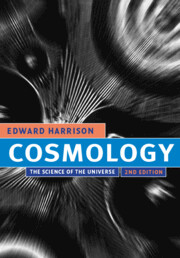20 - The early universe
from PART III
Published online by Cambridge University Press: 05 June 2012
Summary
The living throne, the sapphire-blaze,
Where angels tremble while they gaze,
He saw; but blasted with excess of light,
Closed his eyes in endless night.
John Milton (1608–1674), Progress of PoesyTHE PRIMEVAL ATOM
The universe expands, and naturally we conclude that in the past the universe was in a more condensed state than at present. If we journeyed back in time we would expect to see the universe get steadily denser. Ultimately, we would arrive at the very high-density state popularly called the “big bang.” This conclusion seems unavoidable. It might be a mistake, however, to forget entirely the many debates among cosmologists concerning the reality of a big bang beginning. Eddington was firmly against the idea of a universe that begins in a dense state, and many persons – particularly those who were drawn to science by Eddington's popular works – have felt disinclined to set his views aside lightly. The steady–state theory of an expanding universe, proposed in the late 1940s, attracted many who were united in their dislike of the big bang idea, and even now, as the 20th century closes, a few cosmologists continue to think that a big bang interpretation of the observations is mistaken.
What do we mean by the expression “big bang?” The actual singularity of maximum density at the origin of time? Or an early period in cosmic history? If the latter, how long a period?
- Type
- Chapter
- Information
- CosmologyThe Science of the Universe, pp. 413 - 437Publisher: Cambridge University PressPrint publication year: 2000

